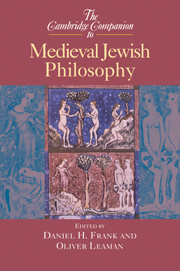Book contents
- Frontmatter
- PART I BACKGROUND AND CONTEXT
- PART II IDEAS, WORKS, AND WRITERS
- 4 Saadya and Jewish kalam
- 5 Jewish Neoplatonism
- 6 Judah Halevi and his use of philosophy in the Kuzari
- 7 Maimonides and medieval Jewish Aristotelianism
- 8 Maimonides and the sciences
- 9 Medieval Jewish political thought
- 10 Judaism and Sufism
- 11 Philosophy and kabbalah
- 12 Arabic into Hebrew
- 13 Philosophy in southern France
- 14 Conservative tendencies in Gersonides’ religious philosophy
- PART III THE LATER YEARS
- Guide to further reading in English
- Index
11 - Philosophy and kabbalah
1200–1600
from PART II - IDEAS, WORKS, AND WRITERS
Published online by Cambridge University Press: 28 May 2006
- Frontmatter
- PART I BACKGROUND AND CONTEXT
- PART II IDEAS, WORKS, AND WRITERS
- 4 Saadya and Jewish kalam
- 5 Jewish Neoplatonism
- 6 Judah Halevi and his use of philosophy in the Kuzari
- 7 Maimonides and medieval Jewish Aristotelianism
- 8 Maimonides and the sciences
- 9 Medieval Jewish political thought
- 10 Judaism and Sufism
- 11 Philosophy and kabbalah
- 12 Arabic into Hebrew
- 13 Philosophy in southern France
- 14 Conservative tendencies in Gersonides’ religious philosophy
- PART III THE LATER YEARS
- Guide to further reading in English
- Index
Summary
Philosophy and kabbalah were highly variegated programs for the interpretation of rabbinic Judaism. Although kabbalah was rooted in the esoteric traditions of late antiquity, it became a self-conscious program for the interpretation of Judaism at the end of the twelfth century, to counter Maimonidean intellectualism. Nonetheless, kabbalists addressed the theoretical issues of concern to the rationalist philosophers and theorized within the conceptual framework of contemporary philosophy. In the second half of the thirteenth century, two types of kabbalah were consolidated: theosophic kabbalah mythologized philosophical categories while articulating a comprehensive alternative to rationalist philosophy. Prophetic (or ecstatic) kabbalah, by contrast, developed a full-fledged intellectual mysticism on the basis of Maimonides' theory of knowledge and gave kabbalistic doctrines a philosophical reading. During the fourteenth century a few Jewish philosophers, especially those who cultivated the study of astrology and astral magic, viewed kabbalah and philosophy as compatible schemas that give different names to the same entities. In the fifteenth and sixteenth centuries, the philosophic reading of kabbalah was prevalent in Italy where kabbalah was viewed by Jews, and even by some Christian humanists, as ancient speculative lore necessary for intellectual perfection. In Spain and in the Spanish diaspora the mythical aspects of kabbalah were more prominent. While some kabbalists had a very negative view of philosophy, the dominant attitude toward kabbalah among Iberian philosophers was quite positive. They considered that kabbalah revealed knowledge that completes and perfects human reason and went on to recast medieval Aristotelianism in accord with the teachings of kabbalah.
- Type
- Chapter
- Information
- The Cambridge Companion to Medieval Jewish Philosophy , pp. 218 - 257Publisher: Cambridge University PressPrint publication year: 2003
- 9
- Cited by



